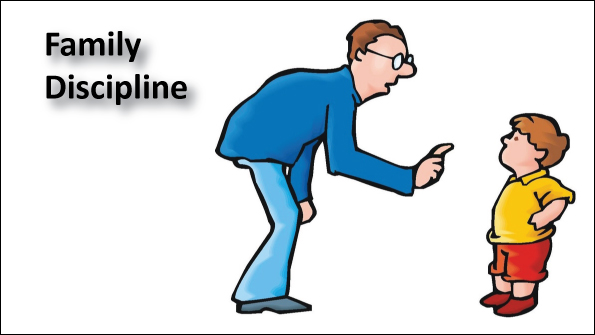By Tyson Thorne

“Be keenly aware that just as a parent disciplines his child, the Lord your God disciplines you. So you must keep his commandments, live according to his standards, and revere him.” — Deuteronomy 8.5 & .6
This verse is a wonderfully explanatory statement that summarizes all there is to say about the issue of discipline in the life of believers. First, we have the aspect of family discipline, then the discipline of the Lord and, finally, the aspect of self-discipline. Along with these three facets comes the responsibility to be a disciplinarian, as well as a servant — one who is disciplined.
—
Let’s look first at the aspect of familial discipline. Probably every parent’s favorite verse in the Bible is Proverbs 23.13: "Do not withhold discipline from your children; if you beat them with a rod, they will not die."
After putting her children to bed one night, a young women changed into a droopy blouse and an old pair of slacks and proceeded to wash her hair. All during the shampoo she could hear the children growing wilder and noisier. Finishing as hurriedly as possible, she wrapped a large towel around her head, stormed into their room and put them back to bed with a stern warning to stay there. As she left, she heard the two year old say to her older brother in a trembling voice: “Who was that?”
The Bible warns parents not to exasperate your children. I think this is backwards, I think children exasperate their parents far more often. Of course this is usually because the child disobeys one of the Ten Commandments, “Children obey your parents.” As a parent, you can discipline your children. You can give them a “time-out”, you can ground them, you may even spank them (though today’s culture frowns on the practice). These are all valid forms of discipline, according to Scripture.
There are many verses in the Bible that discuss the discipline of children. But what happens when someone else’s child breaks one of the Ten Commandments? Sometimes, it may not even be a child that breaks them, but an adult. Is there anything we can do in such a case? There is if they claim Christ as Lord! Believers are a family in Christ. For this reason we are responsible for the disciplining of each other. Jesus outlines how to do this in Matthew 18.15-.20:
“If your brother sins, go and show him his fault when the two of you are alone. If he listens to you, you have regained your brother. But if he does not listen, take one or two others with you, so that at the testimony of two or three witnesses every matter may be established. If he refuses to listen to them, tell it to the church. If he refuses to listen to the church, treat him like a Gentile or a tax collector.
“I tell you the truth, whatever you bind on earth will have been bound in heaven, and whatever you release on earth will have been released in heaven. Again, I tell you the truth, if two of you on earth agree about whatever you ask, my Father in heaven will do it for you. For where two or three are assembled in my name, I am there among them.”
Biblical discipline begins with a call to repentance. Step one is to point out the fault or sin of the other. Of course, you had better be sure the person actually sinned. Notice that verse 15 reads, "If another brother sins against you…" You need to have first hand knowledge of the members wrong. This means that if you hear of a person’s wrong doing, you do not approach them. The person who was wronged is held responsible by God to go to that person and attempt to call them to repentance. It is not for a believer to condemn or to confront another on mere hearsay or gossip. To do so not only shows that you have done wrong by listening to gossip, but you have robbed the one who was wronged of the opportunity to fulfill the Biblical guidelines of reproof. In short, you would have sinned against God, against the sinner, and against the victim.
Therefore, the victim goes to the sinner to confront him of his sin. As a believer, he is to be open and receptive to the victim. He ought to hear the other out, and either ask forgiveness, or clear up the misunderstanding that prompted the other to feel victimized. But if he does not, the one sinned against may leave and return with witnesses, so that everything may be accounted for. If this still makes no difference to the evildoer, then he is to be brought before the church to be shown the seriousness of his offense. If still unrepentant, he is to be judged.
Judgment must be made carefully. Jesus Himself is present with the judges, and the decisions they make are sealed by heaven itself. Better than judgment, is forgiveness.
I don’t think that you necessarily need two or three witness to confront your children. The rules are a little different when living under one roof. However, how much better would it have been for that mom I mentioned earlier if, instead of sweeping through the children’s room in a rage and putting the children back to bed, if she had taken the time to explain to them what they did wrong, that they were disobedient to her and therefore to God, that they needed to ask forgiveness from both her and God and go right to sleep! I’m not above a stern rebuke or even a little physical discipline, but a first offense deserves an opportunity for repentance — even in the small things.
Click for the net article in this series: http://www.think-biblically.com/10-lucubrations/28-god-s-discipline
|
|
|
